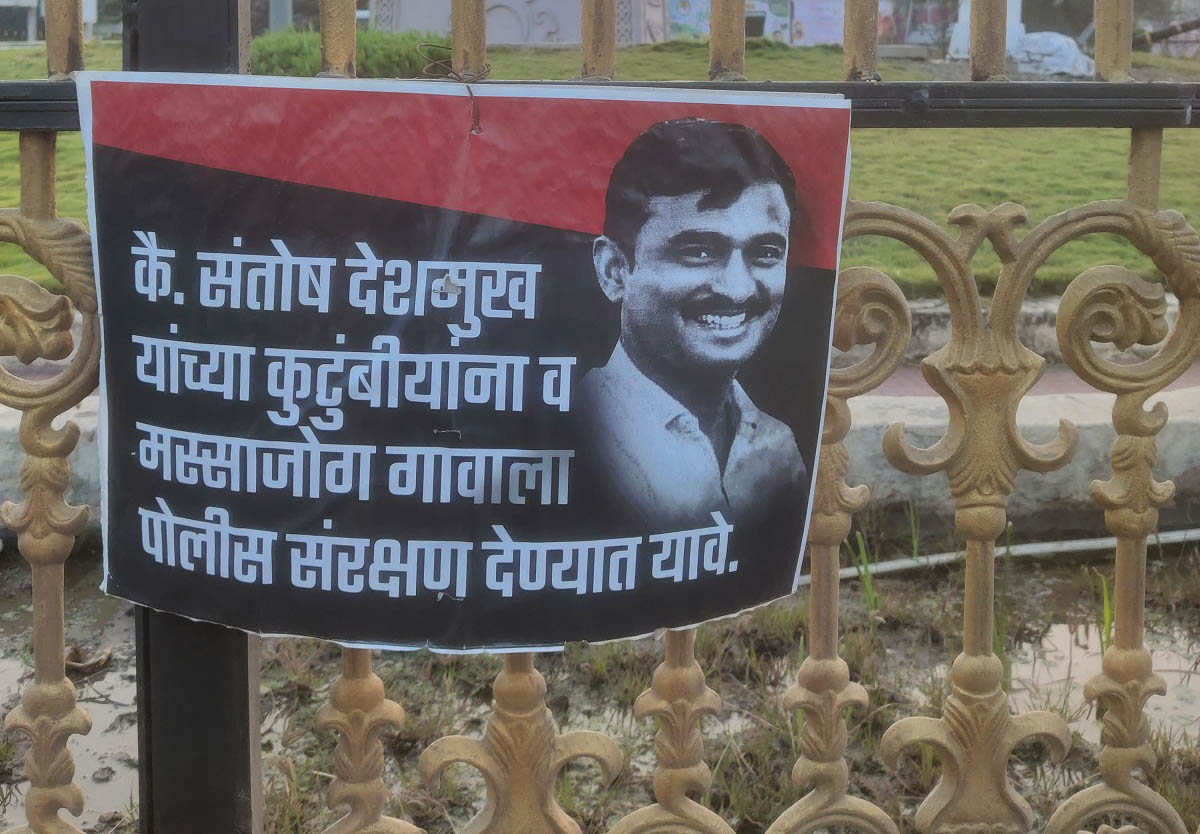The tea-stall owner participates in our discussions spontaneously. He says, “You know, as common citizens, we don’t have any toxic hate for each other in Parli. It is the national and local media which is always in search of some ‘masala maal’ (sensation) in their news. Parli is a small town. When it comes to daily business, everyone’s interest may clash with that of another person despite his or her caste. So, the ground reality is really different. No doubt, there are some inevitable side effects of these unwanted happenings but, everyday life has not been that affected. The common man, here in Parli, is not standing in support of criminalised politics. People are becoming wiser day by day. We know very well that such a path won’t lead us to a peaceful life.
Another businessman friend of Sunil claims that Vanjari women are pure vegetarians. So, one should not see Vanjaris as a criminal tribe. He also adds, “Suppose there comes a flood, then all the garbage gets washed away in it and the area gets clean. We are anticipating that it will be the same after this political power war gets over. One can imagine the destructive social impact of this whole eco-political power game has created by the fact that four ‘soyrik meetings’ in my Vanjari community (meetings in which marriages of young couples get fixed) were discarded as some of the people in such meetings had differences in their opinions. One can definitely say that the political happenings keep impacting the ‘Roti-Beti Vyavhar’ (family relations) deeply.
Shantabai Rathod is a social worker in Parli. She has fought many civic fights there. In our short meeting, she underlines the fact that there are hardly any women in active politics in a taluka place like Parli. Anyone can have a look at ZP and Panchayat Samiti politics and sense the lack of presence of women there. Our men don’t want any space to be created for women. And now, these dirty eco-political power games make politics as well as town-space more unsafe for women. Beed is a district where liquor visibly flows everywhere in criminal and political scenes.
There is a plant of Awada wind energy firm near Massajog. CRPF have been assigned to guard that firm. One of the CRPF officials said, “We are here on duty to maintain law and order. We don’t know what had happened earlier.” While traveling from Beed to Parli, I could see several large huge trucks up and down on the roads with enormous fins tied to their back.
Jyotiram Kande is an NRI working in an IT field in Canada. He was born and brought up in Parli. While sharing his thoughts on a phone call, he expresses deep sorrow about the changing environment of his beloved city. Jyotiram was born and brought up in Parli. While recalling his childhood days, he says, “I still remember my teenage and childhood days. Those days seem like a fairytale when I roam the streets of Parli nowadays. We, as teenagers, were into different things those days. Today’s teens have already started glorifying goons as ‘social workers’. I am just not able to imagine why common citizens are not aware of their rights when it comes to the basic needs like electricity, water, transport and health. Many of my friends are not able to think logically today. They just get driven into personal-political emotions. I can’t hold any constructive conversation with my own friends in such a situation. Even my well-educated, government officer friends are not an exception. Due to all these things, I have started to feel kind of helpless.”
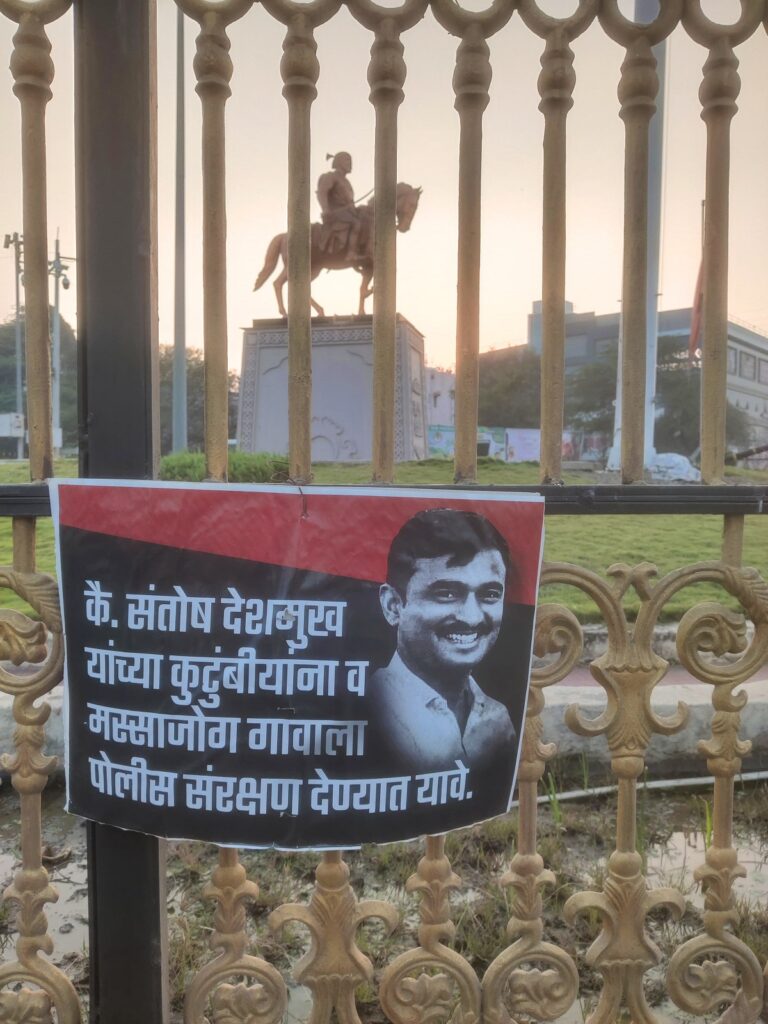
Jyotiram also shared his observations about the young teenage boys who are being used as goons by various political leaders. He says, “Common people have always looked at political leaders as some God-like figures. None of these politicised youth are into serious academics. Their leaders are of the same ilk and have become career icons. These youth get addicted to cigarettes, alcohol, and gutka-mava very easily. Sexual frustration also plays a crucial role in their behaviour. Everyone wants a girlfriend but no one gets one. I am just not able to imagine the speed of transition as I look at the changed scenario to compare it with my childhood days. Everyone has a perception that some other person is going to grab his or her educational seat, job, opportunity, monetary gains etc. I don’t find any institution or government body sufficiently aligned, systematic or transparent so that this could solve the issues of the common man. In such a situation, political goons that are so called social workers easily fill this space. Within no time, they just come forward to be a bridge between this purposely failed system and common man. And within no time the godly image of such political goons assume a larger than life aura. One needs a truly good governance to circumvent this scenario. The enormous energy of youth should also be channelised pro-actively to avoid destructive consequences. At village level, Gram Panchayats and social organisations should start gyms and libraries for the young generation.”
One of the random vegetable sellers in Parli was also anxious about the changing surroundings. He said, “We can feel that there the casteism in the air. Though everyone is not experiencing it directly, it’s there. In many conversations. We need to think twice about the ‘caste location’ of the listener. It was not like that before. I needed to check the caste location of everyone online and offline. Because most of the time, people keep talking from their caste location and not from their conscious location.
Meanwhile, one of my friends in Parli anonymously told me his experience when he went to a Biryani eatery with one of his friends. “I was sitting at one of the popular Biryani joints in the outskirts of Parli. It was crowded as always. All the tables were full. Both of us were eating at a table where one chair was vacant. One young guy came up and sat on that chair. His friends grabbed other vacant chairs at different tables. That guy at our table was fully drunk. He was in the mood to have a conversation with us. So, he asked my name at first. As I responded, his second question was, what’s your caste? I just ignored his question with a smile. Then he got angry and started boasting about his money and muscle power. My friend and I were listening to his babbling with a cool mind. At the end of his conversation, he told us that he possessed a gun until the week before but now he has surrendered it. Me and my friend finished eating and went to wash our hands. That guy came to us again. I kept my hand on his shoulder with a friendly gesture and told him that I am Mali (one of the OBC castes). He suddenly smiled at me and said, ‘Jai OBC bhava!’ Caste has penetrated this deeply in everyone’s veins, much like hard liquor.”
Keshav Waghmare is an author and a senior activist from the Ambedkarite Movement who hails from Beed. He has a separate vision about this whole state-wide issue of Beed which has been the talk of the town for the past two months. Keshav says, “To understand the scenario in its entirety, one needs to understand the construction of the political economy of Beed at first. The Vanjari community has got geared up politically and socially when the politics of Gopinathrao Munde was dominant. Until then, the political power was in the hands of the Maratha community. This shift in power politics gave birth to a constant tussle and cold war. In Beed, the major economy is based on sugarcane cutting. The mukadams (contractors) of sugarcane workers are mostly Vanjaris. Most of the time, these contractors behave unfairly with men and women in his toli (sugar-cutting team). Once upon a time, these mukadams were the karyakartas (workers) of Gopinathrao Munde. When it comes to land, most of the land business is in the hands of Vanjaris.
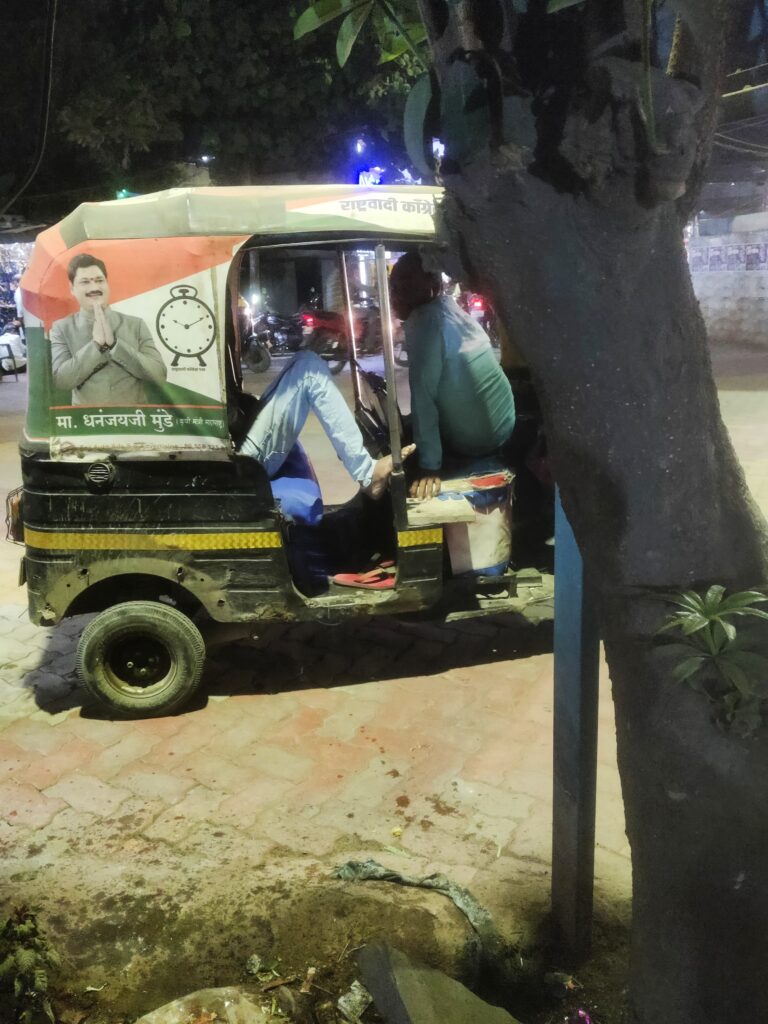
I recall one incident that refuses to fade in memory. There was the weekly aathawdi bazaar (weekly market gathering) at a village called Wadwani. There appeared a mukadam with one of his labourers. Both belonged to the same caste, Vanjari. There started a heated argument between two of them over some monetary issues. The mukadam started beating that labourer with his shoes. Coincidentally, there was a programme of Gopinathrao Munde planned on that day. Munde’s helicopter suddenly started making rounds in the air. The worker stopped crying and started waving his hands in the air with joy, shouting, “O mukadam, bagha aaplya bhaucha helicopter…” (Hey, mukadam, see, there comes the helicopter of our beloved bhau!”) Isn’t this very symbolic?” These mukadams are kind of powerful goons in small villages of Marathwada. They have got political support. The roots of the constantly erupting violence in Beed could be found in this nexus.
It was an interesting encounter with a politically vocal truck driver. He showed me his facebook account where he keeps expressing his views deliberately. He said, “We keep experiencing virtual casteism as people keep fighting with each other on social media. The leaders should keep the politics limited to elections. They are not expected to encash caste as a cash cards from the common people. In old times, it was different. Leaders used to think beyond casts. In this particular case, political Maratha leaders like Suresh Dhas have glorified false and imaginary things which were not even mentioned in the post-mortem (PM) report of Sarpanch Deshmukh. In the winter session speech, he said, the eyes of Deshmukh were burnt with a lighter. He also said some goons in the mob might have peed in Deshmukh’s mouth when he was pleading for water before dying. These false narratives percolated have percolated among the mob like a wildfire. Who is accountable for the caste-based hate being spread in Maharashtra? Now the Zilla Parishad elections are imminent. No doubt the politicians will try and encash this caste based fragmentation. Despite the fact that there is a serious agrarian crisis here, none of our ‘leaders’ seems to pay heed to it.”
All of the accused in the Santosh Deshmukh murder case can be seen observing a particular lifestyle. They come from a lower or lower middle class family but possess vehicles like Scorpio with VIP numbers like 3333, 7777, 1010. They have a particular aesthetic with a lot of swag. They wear white linen or khadi clothes with very fragile egos on their sleeves. They like to flaunt gold ornaments. Addictions like Gutka, Maava, Pudi (tobacco) are very common, especially in Marathwada. From a very young age, distracted from academics, they start following some local or state level leader. The local level contractor-ship and extortion activities for the leaders are their main income source. Obviously most of them have a criminal background. On social media, especially on Facebook and Instagram, one can find thousands of accounts run by such Bhau, Dada or Anna. On Instagram they have thousands of followers. They keep making reels about their leader. For example, when Valmik Karad surrendered to CID, Vanjari Insta Reelstars made reels for him with these songs playing in background, “Bhetal java me gunhyaat, mala atak kara ho Punyaat” (As you will find me involved in some crime, just arrest me in Pune”). This song was originally written by Ajay Gaikwad for a Bailgada Sharyat Premi (Bullock cart racing lover Person) Pandhari Sheth Fadake. Sometimes they make romantic reels as well. In the time of political crisis, they start a virtual war supporting their leader. They keep trolling opposition leaders though statuses and reels.

This is the season of sugarcane cutting. The sugarcane workers keep migrating to West Maharashtra from Marathwada. I stopped at a temporary basti of some sugarcane workers on the Beed-Nagar road. The workers live in ‘Khopis’. These khopis are made out of dry shoots of sugarcane. The group of workers belonged to the SC Category (Scheduled Caste). They are the followers of Dr. Babasaheb Ambedkar. While discussing the continuous outrages in Marathwada, these workers put their views bluntly. Neeta (Name has been changed to ensure anonymity) says, “See, we are Ambedkarites. We have got the reservation as per the Indian Constitution. For a long time, In Maharashtra, upper castes like Maratha have looked at us as rivals. We deserve reservation. Maratha is a caste in Maharashtra which has been in political power continuously. If this is the reality, then who is to be blamed for this downfall of Marathas? Maratha leaders should be criticised for this and no other reservation-benefited castes.
Ram (Name has been changed to ensure anonymity) invited me for tea in his Khopi. He and his wife Seema have kept their one son back at their village. He studies in standard 10th. They have brought their elder son with them who will take his 12th exam in a few months. Seema has also brought her younger daughter with her. While making the tea on an earthen chulha (stove), Seema says, “Aamchya kashtachi sakhar aahe bagha he, bagha kasa lagatoy chaha…” (This sugar is made out of our own labour, see how the tea is flavoured” while adding sugar in the tea. Seema is concerned about the education of her children.
Ram says, “We are SC by caste, but as a sugarcane worker, we all worship our Lokneta (Leader of masses) Gopinath Munde (Former Union Minister for Rural Development and Panchayat Raj), who did revolutionary work for the sugarcane mazdoors (labourers) of all the castes and tribes. He is like a god for us despite his caste. But nowadays the environment of Maharashtra has got so toxic that most of the people are judging each other on the basis of caste. This is not going to lead us anywhere. As a state, we have got bigger problems to solve. As a sugarcane worker, I need to break this vicious cycle of migration and poverty within my family. I don’t want my next generation to do all this harsh labour.” I bid farewell to the khopi-residents as they needed to start the next day at 3 am and start for the sugarcane fields.
Fidel Chavan, CPI leader, is a lawyer at Beed district court. Fidel has an experience of making interventions in some of the path-breaking court cases. There is a windmill repairing centre at Massajog. The fins of the windmills are around 70 to 175 meters long. One needs to construct a runway to take these fins through the farming fields. The lands of the farmers have been taken on lease for this purpose.
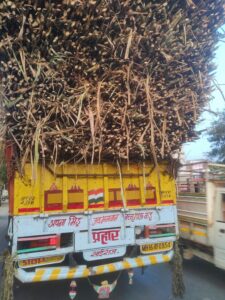
One of the young leaders accused of extortion, I am told, is Sandeep Tandale. Tandale hails from a poor family but owns a Scorpio car. He leads a team of 10-12 small goons and pays each one 17-20 thousand rupees. And there are so many of such political goons all over the Beed District. Most of the more powerful political leaders have tamed such goons for their benefits. Both the parties share a mutual political and monetary benefit. I need to think twice before I speak nowadays. It was not like this before.’
Mitali Deshmukh (Name has been changed to ensure anonymity) works at a technology firm in Pune. She is back home in Beed for a few days, her native place. She expresses herself in a nervous voice, “Beed people are the best when it comes to maintaining friendships. But these days, we are getting trolled on the basis of which native place we belong to. Several WhatsApp group admins have limited their group settings for one way messaging only, ‘admins only’. All this is new for an educated, conscious social girl like me. I am upset to see this new, unwanted wave of division flowing through my beloved city. I have never discussed such dark things with my family ever. These are some exceptional, hard days. I hope they will pass soon”
Prakash Chavan is a senior journalist from Parli. He shares his experience of reporting on the Ash power nexus, “It was the year 1971. A thermal power plant was constructed in Parli. Earlier no one knew the value of the ash which was the residue of the plant. There are two types of ash derived in the thermal power making process. One is dry ash (fly ash) and the other is bottom ash. This bottom ash is used for making bricks. Hence, the bottom ash has got a big market value in itself. This has given birth to many ‘Ash Mafias’ in Parli Taluka and Beed district. Along with this, there are many Sand Mafias in the same area. At Daudpur, there was a dam where all the ash was being dumped for a long time. People planted trees there. Some awards were also conferred on that project. But as the value of the ash was underlined over a course of time, things changed drastically. Same kind of ash-lake was there at Daabi as well. These Mafias illegally dug out all the ash five years ago. These mafias have vast political support which is what has made them both powerful and brazen about their acts.
Maratha was a capitalist caste when it comes to land, money and power. But in the last 30 years, Marathas have got stuck in an agrarian crisis. Basically, the struggle and articulations should be class based and not caste based. But the people in power need the fight to remain caste based as they are going to benefit from it without delivering structural change. Here, population wise, the Maratha is the most prominent caste but the power is in the hands of Vanjari caste. In India, one can sense the caste based scenario, that is, most of the times, the majoritarian caste overpowers other castes. Here, in Parli, population wise, the Maratha is the most prominent caste but the power is in the hands of Vanjari caste. That is one of the causes of political and social tensions which keep erupting constantly. In Ashti-Patoda, the Maratha caste overpowers Vanjaris.
I feel like this is the fight between large big elephants. They just don’t care about other ant-like castes and communities. I keep wondering what will be the future of micro-minorities now and over time. Now the newly elected state government in Maharashtra has completed three months but no one is in any mood to discuss real life issues. This is basically a fight to gain and save reservation. Parli has got three collages. But most of the school and college students prefer to migrate to Latur for their studies. What is the future of this city?”
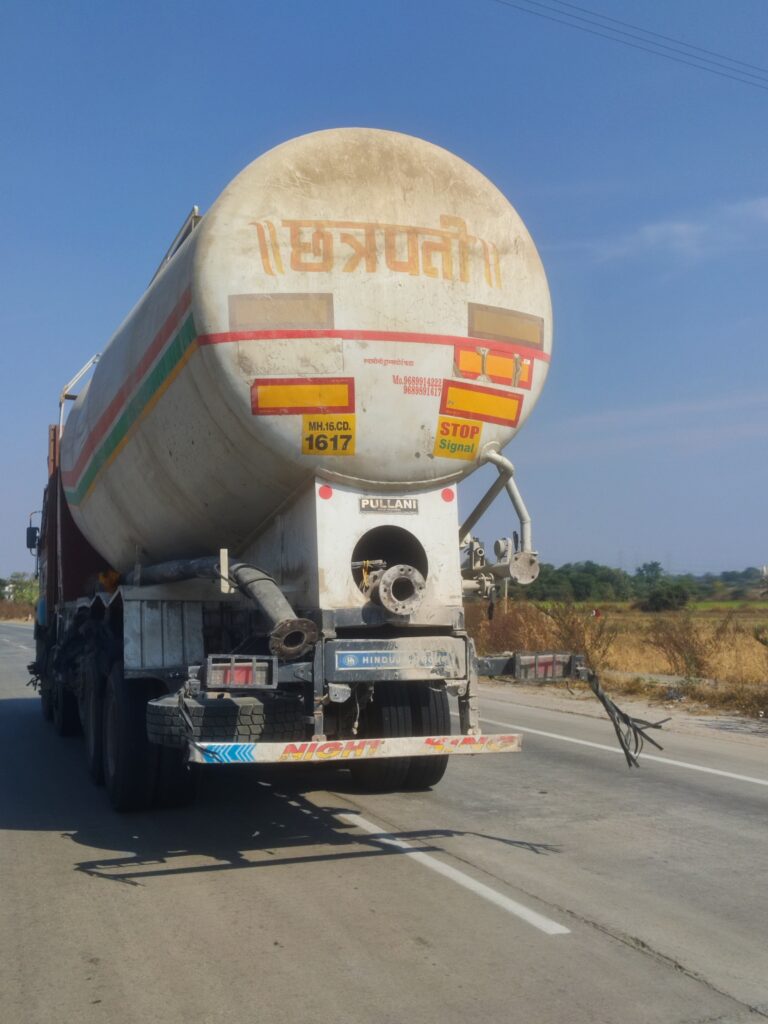
One of the Dhangar youth expresses his feelings while the hunger strike of Maratha Leader Manoj Jarange has started once again at Antarwali Sarati (Dist Jalna). “All this hate against us OBC’s has been sowed purposefully so that the ‘crop of Maratha reservation can be harvested.’ There are political egos behind the murders and tension created in Beed district. We shall all be paying a price if we paint this murder of Santosh Deshmukh in the colour of caste. We, as OBC’s, have found our own voice, our own pathways now. I, as an OBC youth, have started feeling that Marathas have just used us, under the blanket of the term ‘Bahujan’. But now, we are enlightened enough to fight our own fight as OBCs and not as Bahujans.”
On the way back from Beed, I realise, there is a strong strain of identity politics in this region. Adverse geographical conditions, agrarian crisis, scarcity of quality education, lack of employment and development make this politics darker. Most of the trucks or dumpers could be seen carrying a strong identity of some Caste or a political leader. ‘Chatrapati’ (Maratha) ‘Jai Bhagwan’ (Vanjari), ‘Apna Bhidu Bachhu Kadu’ (Political leader Bacchu Kadu), ‘Hoy Hinduch!’ (Yes, I am a Hindu), Jai Bheem (Ambedkarites) are some of the popular and visible slogans. Among these slogans, the enormous fins of windmills also keep crossing the paths. This region keeps shouting, Caste is not a thing to be apologetic about! It’s a thing to be flaunted, to be encashed! For the politics of the vote bank, as well as for the politics of survival. Caste could be personal, but let’s not forget, personal is political!
(With special thanks to Ashok Abuj, Sukeshini Naikwade, Dyaneshwar Mauli Munde, Amol Waghmare, Mahadev Shinde, Fidel Chavan, Comrade Namdevrao Chavan, Keshav Waghmare, Dinkar Choure, Baban Wadmare, Prakash Chavan)
Special Thanks to Adv. Pankaj Chavan
All photos credit – Yogesh Bhausaheb Dhakne
(This is Part 2 of the ground report. The author is an independent journalist and can be reached at sharmishtha.2011@gmail.com)
Related:
Massive all-party march in Parbhani demands justice for Dalit youth’s custodial death
